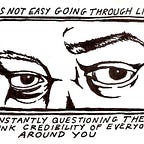Sweet Tooth
“Sweet Tooth” was for me and will likely be for many who watch it the first piece of popular culture that deliberately apes what we have all just lived through. In the 8 part Netflix series released on June 4th, we watch as the deadly H5G9 virus begins to spread; people fearfully adjust masks and argue about whether they are a form of social control. There is debate as to whether the strain has leaked from a lab. It is all superficially familiar.
While adapted from a comic that first appeared in 2009, Sweet Tooth was filmed in mid-2020 (with permits, in New Zealand). Its gestures towards our pandemic experience are very much meant, even if the show’s premise (the plague brings with it “hybrid children”, babies born part human and part animal) is somewhat more fantastical.
And yet, for all this verisimilitude registers as novel, as something newly crossed into the world of the screens and reflected back at us, the programme’s grounding in its plague world feels flimsy. With a lead character who is part boy, part deer, perhaps things were always going to be twee; and yet it has somehow managed to be twee in a very specific and strangely dated way. It’s like Mumford and Sons do the apocalypse, but not how they actually did it, which was by going a bit fash, but how they would have done it in 2013, in that period where Buzzfeed listicles of tiny house and tiny, meaningful tattoos were very in, along with shirts with pictures of wolves and deer superimposed on geometric patterns.
Pandemic wise, I have been to the year 3000; I do not need Sweet Tooth’s 2013 hipster folk revival version of the end times. It is possible for shows to fail not on their own merits, but on the comparative merits of the things that they resemble, and it is impossible to watch Sweet Tooth without being reminded of Utopia, which on Channel 4 in 2013 provided a far more accurate rendering of our current predicaments than 2021 has yet to. The two shows clearly share some DNA, both concerning flu pandemics, ideas of genetic purity, and conspiracies relating to hybrid humans, and both starring Adeel Akhtar as fundamentally decent men who find that they will do unspeakable things for the causes in which they believe.
We have all just lived through something. The ridges on the roofs of our mouths are burnt and we are changed to ourselves as the world is changed around us. Hundreds of thousands of people have died. There is no television programme that could sum this up, but the strangest and most extreme art can rhyme with the strangest and most extreme experiences, and in Utopia, drab and saturated, soundtracked with unseen steady voiced news readers reporting a dying world, every corner of the screen hung with the sensation of being hunted, you can feel a little of the world we have come to inhabit.
In its unusual position- standing in the shadow of both the surreal reality of the plague, and the shifting cultural shadow of Utopia- Sweet Tooth, which might otherwise have come and gone quickly and passed into the silt at the bottom of the riverbed of Netflix original serieses and out of memory finds itself sticking, and not in a particularly good way. Both Sweet Tooth and Utopia take place primarily on the road. In Sweet Tooth our characters travel through scenic forests and across grassy plains framed under big skies, and you always feel that they are making progress on their journey: they have the invisible hand of narrative propulsion seeing them right. In Utopia we watch the protagonists travel constantly, through car parks and motor way services stations and the alleys at the backs of people’s gardens, moving through all of the barely places of our world. They eat crisps and are always tired and uncertain. Sweet Tooth unfolds on screen like a show that had the luxury of being filmed in New Zealand. Utopia is a cramped desk chair of a programme; it feels like it has been working and eating and sleeping in the same room for months.
Utopia was cancelled after two seasons in 2014, and was subject to an American remake, released in 2020, which I have not seen and do not intend to see. This seems to me akin to trying to remake a memory; the light will never slant quite right. Sweet Tooth, of course, is not a remake; it is not trying to be. You suspect the thing it most aspires to resemble is Station Eleven, Emily St John Mandel’s 2014 novel about a theatre company touring the remnants of America two decades out from a devastating pandemic. Station Eleven spins a world that is settled into its catastrophic changedness, where a new, quiet beauty is beginning to come clear; it was meant to be filmed for television in 2020, with Himesh Patel and Mackenzie Davies in the leads. Production was cancelled due to the pandemic.
Sweet Tooth, then, is not Station Eleven, and it is not Utopia, but it is not Utopia in a world that very much is, and I will brook no halfway houses, no attempts to light the path we have just walked with mason jars full of fairy lights. It is dangerous to be a pale imitation of something whose teeth have only become more real over time.
